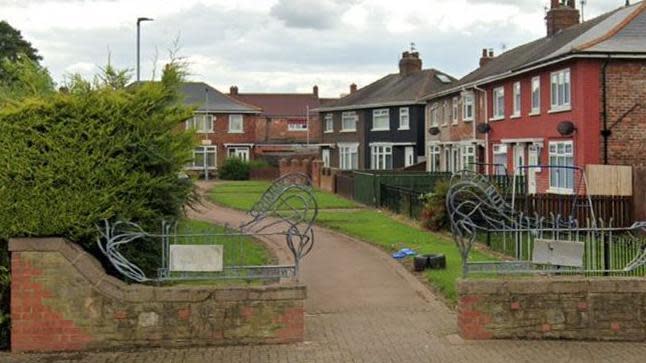No direct evidence man murdered victim - judge

There is no direct evidence that a man accused of murdering a woman for her jewellery killed her, a judge has told jurors.
Andrew Hall, 46, denies murdering Glenna Siviter, 50, at her home in Middlesbrough in December.
Ms Siviter had been stabbed 36 times and her body lay hidden beneath a sofa for four days, Newcastle Crown Court heard.
Giving his legal directions to jurors, Judge Mr Justice Nicholas Lavender said there were 12 pieces of "circumstantial" evidence which prosecutors claimed showed Mr Hall's guilt, but the defendant said were unreliable.
Prosecutors claim Ms Siviter was killed at her home in Grimwood Avenue sometime between 03:00 GMT and 13:20 on 11 December, with her body found in her living room four days later by her adult son.
It is alleged Mr Hall, who was a childhood friend of Ms Siviter and said to be like a "brother" to her, killed her to steal her jewellery to sell for drugs.
After he declined to give evidence at his trial, the judge provided legal directions to the jury.
Mr Justice Lavender said there was "no direct evidence Mr Hall killed Ms Siviter", such as a witness or camera footage, so the crown "relied on circumstantial evidence".
He said that included:
CCTV footage showed a man which prosecutors said was Mr Hall going to her home at about 03:00 and leaving at 13:22 on 11 December
She did not use her phone after 02:50 on 11 December and electricity usage at her home in the following days was consistent with it being unoccupied
A DNA profile matching Mr Hall's was found under her fingernails, on the sofa and on Ms Siviter's left sock, "consistent with his having manhandled or manoeuvred" her
Mr Hall's finger print was found on Ms Siviter's coffee table
Ms Siviter's passport and other documents were found in a bag showing traces of his DNA profile, in a car Mr Hall was using
Pathologist Dr Jennifer Bolton said Ms Siviter's time of death was closer to the "last time she was seen alive" on 11 December than to when her body was found
Footprints in her living room could have been from Nike Air Max 2090 trainers which an expert believed Mr Hall was wearing in CCTV footage of him on 11 December
CCTV footage failed to confirm the accounts of several people who said they saw Ms Siviter in the days after 11 December

The judge said Mr Hall would respond by saying there were "too many gaps and unanswered questions" in the prosecution's case, including:
Surveillance cameras only covered the rear of Ms Siviter's home and that coverage was "partial"
She was in the habit of turning off her mobile phone and the drop in her electricity usage did not prove she was dead
Mr Hall was a regular visitor to the house and forensic experts could not say "when or how" DNA matching his was left at the scene, adding he "frequently cuddled and hugged" Ms Siviter
He was not seen on CCTV carrying the bag containing Ms Siviter's passport and documents
Dr Bolton admitted post-mortem changes were an "imperfect way" of determining the time of death and she also offered conflicting opinions
The shoeprint expert could not say when the trainer marks were made in the living room and they only looked "similar" to the sole of a common brand of trainer
Several people said they saw Ms Siviter alive after the time she was allegedly murdered and the lack of CCTV footage did not prove "they were wrong"
The judge said it was up to jurors to decide "which pieces of evidence were reliable" and it was for the prosecution to make them "sure" Mr Hall was guilty.
Mr Hall declined to give evidence and the judge said that was his "perfect right" as it was for the prosecution to prove their case.
But, the judge said, jurors were "open to conclude the reason he remained silent" was he had "no answer to the [prosecution's] case or none that would stand up to examination".
'Intention to kill'
In his closing speech to jurors, prosecutor Peter Moulson KC said robbery appeared to be the motive for the killing and because her alleged killer was known to Ms Siviter, they had to kill her to stop her identifying them to police.
He said the 36 stab wounds to her head, neck and body could "leave no room" for any intention other than to "kill".
He said Mr Hall would have known Ms Siviter would "welcome him in" whenever he visited and there was "no sign of forced entry" at her home.
Mr Moulson said there had been "not one word" from Mr Hall about the allegations and his silence was significant, adding the evidence called for an "explanation" from the defendant.
Mr Hall, of Thorntree Avenue in Middlesbrough, also denies the attempted murder of two men in stabbings in the days between Ms Siviter's death and the discovery of her body.
The trial continues.
Follow BBC Tees on X (formerly Twitter), Facebook and Instagram. Send your story ideas to northeastandcumbria@bbc.co.uk.


